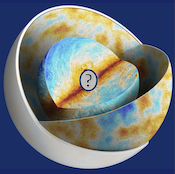Orateur
Description
Experimental cosmology is always in needs of innovative more performant technology for longer and more sensitive observations. Cooling systems can be a limitation in term of the mission lifetime and temperature stability of the sub-K detection chains. A Closed-Cycle Dilution Refrigerator (CCDR), providing continuous cooling at ultra-low temperatures (100 mK) using helium isotopes 3He and 4He, designed for space applications, and therefore future Cosmic Microwave Background (CMB) projetcs, is being developped. Unlike its Open-Cycle counterpart (OCDR) used in missions like Planck-HFI, the CCDR operates without depleting helium supplies, enabling indefinite mission durations. The cooling power is generated by separating the helium mixture into 3He and 4He, re-circulating them through the system. Compared to OCDR, CCDR delivers greater cooling power (>2 µW vs. <0.2 µW) and longer observation periods (>3 years vs. <2.5 years) with consistent temperature stability (20 nK·Hz -0.5). The CCDR is being developed for microgravity environments. Within the system, a porous sponge separates liquid and gas phases in the "still." A circulator pumps the gaseous 3He, while a fountain pump extracts superfluid 4He, ensuring perpetual cooling. Laboratory tests confirm its feasibility, achieving Technology Readiness Level (TRL) 4. Transitioning to TRL 5 for space missions requires further validation through an Engineering Model (EM). This presentation will emphasize the CCDR design and provide an update on the progress and developments undertaken by our team.
